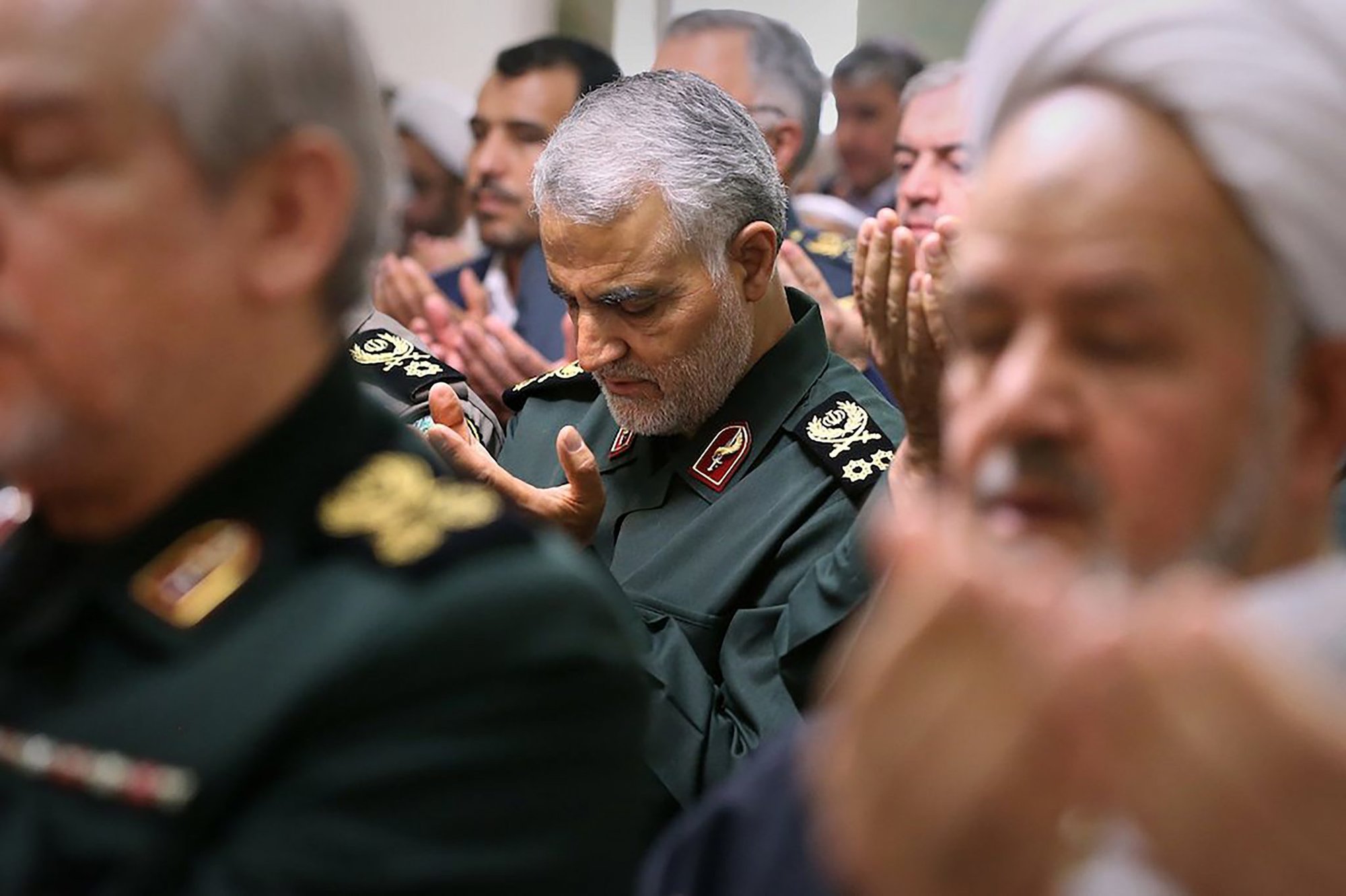
Wikimedia Commons image.
This article was originally published Jan. 3, 2020, on Radio Free Europe/Radio Liberty.
Thousands of Iraqis converged on central Baghdad’s Tahrir Square on January 3 to mark the first anniversary of the twin assassinations in a U.S. air strike of a top Iranian general and a leader of an Iraqi powerful Shi’ite militia.
Last year’s U.S. drone strike near Baghdad airport killed Major General Qasem Soleimani, the commander of the elite Quds Force of Iran’s Islamic Revolutionary Guards Corps (IRGC), and Abu Mahdi al-Mohandes, the deputy head of Iraq’s Hashd al-Shaabi militia, along with several other Iran-allied militiamen.
Many of the demonstrators were holding posters of Soleimani and al-Mohandes while some demanded the expulsion of U.S. troops from Iraq.
Thousands of mourners marched on the highway leading to the Baghdad airport on the evening of January 2 to honor Soleimani and al-Mohandes and eight other men killed in the U.S. attack.
The scene of the U.S. drone attack was turned into a shrine-like area sealed off by red ropes, with a photo of Soleimani and al-Muhandis in the middle, as mourners lit candles.
The assassination of Soleimani had stoked fears of military conflict between the United States and Iran.
Tensions between Washington and Tehran have escalated since U.S. President Donald Trump withdrew from the Iran nuclear deal in 2018 and reimposed tough economic sanctions.
At the time of Soleimani’s killing, Trump posted on Twitter that the Iranian had “killed or badly wounded thousands of Americans over an extended period of time and was plotting to kill many more.”
Iran responded to the killing by launching a volley of missiles at bases in Iraq hosting U.S. troops.
Security measures have been tightened in Iraq and security forces were deployed in great numbers. The Interior Ministry said on January 2 that a plan had been drawn up to safeguard the protests.
Security measures were also stepped up in the vicinity of Baghdad’s Green Zone, home to foreign embassies and government offices.
For weeks, U.S. officials have suggested Iran or allied Iraqi militia could carry out retaliatory attacks to mark the January 3 anniversary of Soleimani’s assassination.
On January 2, Iran’s Foreign Minister Mohammad Javad Zarif urged Trump not to be “trapped” by an alleged Israeli plan to provoke a war through attacks on U.S. forces in Iraq.
“New intelligence from Iraq indicate(s) that Israeli agent-provocateurs are plotting attacks against Americans — putting an outgoing Trump in a bind with a fake casus belli (act justifying war),” Zarif said on Twitter.
“Be careful of a trap, @realDonaldTrump. Any fireworks will backfire badly, particularly against your same BFFs,” Zarif added.
A day later, an Israeli official dismissed the allegation that his country was trying to trick the U.S. into waging war on Iran as “nonsense.”
It was Israel that needed to be on alert for possible Iranian strikes on the one-year anniversary of Soleimani’s assassination, Energy Minister Yuval Steinitz said on Kan public radio on January 3.
Copyright (c)2020 RFE/RL, Inc. Reprinted with the permission of Radio Free Europe/Radio Liberty, 1201 Connecticut Ave NW, Ste 400, Washington DC 20036.

Coffee or Die is Black Rifle Coffee Company’s online lifestyle magazine. Launched in June 2018, the magazine covers a variety of topics that generally focus on the people, places, or things that are interesting, entertaining, or informative to America’s coffee drinkers — often going to dangerous or austere locations to report those stories.
BRCC and Bad Moon Print Press team up for an exclusive, limited-edition T-shirt design!
BRCC partners with Team Room Design for an exclusive T-shirt release!
Thirty Seconds Out has partnered with BRCC for an exclusive shirt design invoking the God of Winter.
Lucas O'Hara of Grizzly Forge has teamed up with BRCC for a badass, exclusive Shirt Club T-shirt design featuring his most popular knife and tiomahawk.
Coffee or Die sits down with one of the graphic designers behind Black Rifle Coffee's signature look and vibe.
Biden will award the Medal of Honor to a Vietnam War Army helicopter pilot who risked his life to save a reconnaissance team from almost certain death.
Ever wonder how much Jack Mandaville would f*ck sh*t up if he went back in time? The American Revolution didn't even see him coming.
A nearly 200-year-old West Point time capsule that at first appeared to yield little more than dust contains hidden treasure, the US Military Academy said.












